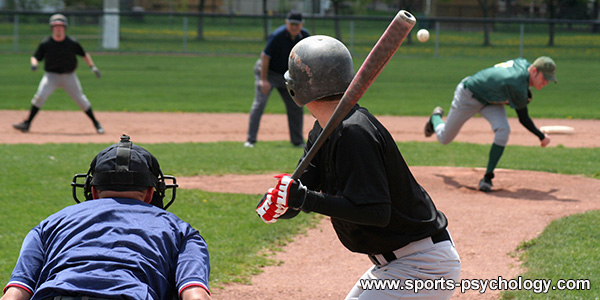How High Expectations Sabotage Mental Game
Summary: Excessively high expectations can weigh heavily on athletes, leading to anxiety, reduced confidence, and underperformance. The story of Mark Appel, once considered a “risk-free” MLB draft pick, highlights how unrealistic demands can erode passion and derail potential.
“Shoot for the moon… Even if you miss, you’ll land among the stars.”
Many athletes adopt this philosophy.
Unfortunately, athletes with this type of mentality heap excessive demands upon themselves believing this method will still result personal best or optimal performances.
The reality is that excessively high expectations rarely result in high-level performance.
When Expectations are High, so is the Pressure to Meet those Expectations
High expectations lead to increased pressure and others negative consequences for athletes and teams, such as:
- Reduced confidence
- Anxiety
- Fear of failure
- Overthinking
- Inability to move past mistakes
- Negative thinking
- Under-performance
One athlete who was crushed under the weight of high expectations was Mark Appel.
Appel was selected by the Houston Astros with the No. 1 pick in the 2013 MLB draft and immediately received a $6.35 million signing bonus.
Appel was heralded as the eventual cornerstone for the Astros pitching rotation after posting a 2.12 ERA during his senior year at Stanford University, striking out 130 batters and walking just 23 in 106.1 innings.
Appel was viewed “as risk-free a pitcher pick as has ever been made” by Sports Illustrated and “the most significant investment the Astros have made in their history in an amateur player” by the Astros’ front office.
Expectations weren’t just high for Appel, these expectations were sky high.
Appel didn’t come close to living up to those excessive expectations, compiling a disappointing 5.06 ERA during his five seasons in the minor leagues.
APPEL: “I go out and pitch, and it’s the same thing every time. I can’t get an out. Walk. Hit. Walk. Hit. Then I’m out of the game. What just happened? Now it’s like I have four days before I get my hopes up again, get excited, build that confidence, not caring what happened in the past. Then the same thing happens again.”
As a result, Appel announced early in 2018 that he is taking an “indefinite break” from professional baseball.
If Appel chooses to not further pursue his career in baseball, he would become just the third No. 1 overall pick to never make the major leagues.
Appel was “expected” to be a dominant MLB pitcher and consistently vie for the Cy Young award each year.
Instead, Appel succumbed to the pressure that results from excessive expectations and eventually lost his passion for the game he once loved.
APPEL: “I’m a guy who loves a game, who had expectations, goals and dreams and then has had everything tumbling, and then everything was unmet. Would I have loved to be pitching in the World Series? Absolutely. Some people have real struggles. I played baseball. I thought I was going to be great, and I wasn’t.”
This is just one story about how excessively high demands can destroy your athletic experience. If you truly want to achieve your potential, your goals should be within reach but also challenge you to stretch for their attainment.
How to Managing High Expectations:
You might have your own person expectations, such as I should not make any mistakes in the game or you might feel expectations from others, such as “I should be the leading scorer on the team.”
You first want to uncover these high expectations that sabotage your mental game. Make a list of what you demand of your game—I also call these the “Shoulds” and “Shouldn’ts.”
Instead of focusing on your expectations, replace them with more manageable goals that help you focus on your role on the team, such as to “find open space” or “make stops on defense.”
Tips for Managing High Expectations in Sports
1. Replace “Shoulds” with Realistic Performance Goals
Athletes often set unrealistic expectations like “I shouldn’t make mistakes” or “I should always score.” Instead, focus on specific, controllable goals such as improving defense, finding open space, or supporting teammates. This reduces pressure and boosts confidence.
2. Focus on the Process, Not the Outcome
High expectations often shift attention to winning or proving worth. By concentrating on controllable actions—effort, preparation, and mental focus—athletes can perform more consistently under pressure.
3. Avoid the Trap of External Validation
Pressure from coaches, teammates, or media can create overwhelming demands. Instead of trying to meet others’ standards, build self-validation by recognizing your progress, effort, and small wins.
4. Learn from Mistakes Instead of Fearing Them
Fear of failure leads to anxiety and underperformance. Athletes should reframe mistakes as opportunities to grow, much like professional players who adjust and adapt after setbacks.
5. Balance Ambition with Manageable Challenges
Dreaming big is important, but excessive demands can crush passion for the game. The healthiest approach is to set challenging but achievable goals that stretch your skills without creating burnout.
Learn how to manage your expectations with “The Confident Athlete” audio program
Related Sports Psychology Articles:
- How to Set Aside Expectations
- Tips for Slump Busting for Athletes
- Learn From The Pros For a Stronger Mental Game
Free Mental Toughness Reports

Get instant access to a mental game report to improve your mental toughness. Are you making one or more of these “deadly” mental game mistakes prior to competition? You can improve your mental game with one of our free sports-specific reports below.
with our free mental toughness reports, you’ll:
- Discover if you have positive or negative pregame jitters.
- Identify your pre-competition mental game mistakes.
- Learn the important pregame mental skills to boost your performance and success!
Learn how mental game strategies can boost your mental toughness in sports with Dr. Cohn’s free mental game reports!
FAQ: Managing High Expectations in Sports
Q: How do high expectations hurt athletic performance?
A: They increase pressure, fuel fear of failure, and create negative self-talk, which often leads to anxiety and underperformance.
Q: What is the difference between goals and expectations?
A: Expectations are rigid demands like “I must score every game”, while goals are flexible, controllable targets such as improving footwork or defensive positioning.
Q: How can athletes avoid being crushed by external pressure?
A: By shifting focus from external validation to internal growth, athletes can measure success based on effort, preparation, and improvement rather than others’ opinions.
Q: What role does mindset play in handling pressure?
A: A healthy mindset allows athletes to view mistakes as part of the growth process and helps them stay present, rather than overthinking outcomes.
Q: What is the key takeaway for young athletes?
A: Balance ambition with realistic, manageable goals. Instead of demanding perfection, focus on controllable actions that build confidence and keep the game enjoyable.
Dr. Patrick Cohn is an expert mental performance coach who has helped athletes for over 30 years enhance their performance. Dr. Cohn earned a master’s degree in sports psychology from CSUF and a Ph.D. from the University of Virginia, specializing in Applied Sports Psychology.

